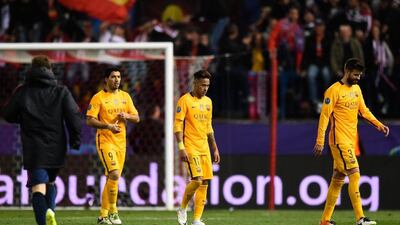Gerard Pique fears Barcelona’s shock elimination from the Uefa Champions League could disturb their bid to retain the Primera Liga title as they host Valencia on Sunday looking for a first win in four league games.
Successive defeats to Real Madrid and Real Sociedad have cut Barca’s lead at the top of the table to from nine points to three, allowing second placed Atletico and Real Madrid, a further four points behind, back into the title race.
Wednesday’s 2-0 defeat at Atletico sent Champions League holders Barcelona tumbling out of the competition they were favourites to retain, and Pique said doubt had started to seep into his teammates’s minds.
“I’m not going to deny that it’s been a very tough blow that we didn’t expect,” he said.
“We have to lift ourselves up, now’s the time, because we’re playing for La Liga and the Copa del Rey and they are two great competitions we want to win.”
More from Atletico v Barcelona:
Reaction: Diego Simeone hails his Atletico, embodying 'values that are less and less common in society'
Gallery: Antoine Griezmann fires Atletico Madrid past Barcelona in a true shocker — in pictures
Pique’s pessimism contrasted with his positive and defiant responses after the defeats to Madrid and Real Sociedad, when he reaffirmed his belief Barca would still win the league.
“We are keen to bounce back and feel strong, but sometimes slumps arrive at the worst moment,” he had said.
Barca are boosted by the return of top scorer Luis Suarez from suspension, but midfielder Arda Turan is banned for picking up five bookings, and Jeremy Mathieu, Sandro Ramirez and Thomas Vermaelen are injured.
Valencia are 14th in the Primera Liga on 37 points. They moved further away from the relegation zone after beating Sevilla 2-1 to earn a first win in five matches in coach Pako Ayesteran’s first home game in charge since succeeding Gary Neville.
It is Valencia’s first trip to the Camp Nou since they were thrashed 7-0 by Barca in the Copa del Rey semi-final first leg in February.
Atletico are back at the Vicente Calderon on Sunday to host struggling Granada, who are 17th and two points above the relegation zone, having drawn their last four games.
Atletico defender Filipe Luis is suspended, as is Granada forward Isaac Success.
Third placed Real Madrid face a local derby at struggling Getafe after top scorer Cristiano Ronaldo hit a hat-trick in a 3-0 win over Wolfsburg to seal their place in the Champions League semi-finals.
Juan Eduardo Esnaider will take charge of Getafe for the first time since succeeding Fran Escriba, who was sacked on Monday following a 10th defeat in 12 games, leaving the team 19th in the table and two points from exiting the relegation zone.
Follow us on Twitter @NatSportUAE
Like us on Facebook at facebook.com/TheNationalSport

